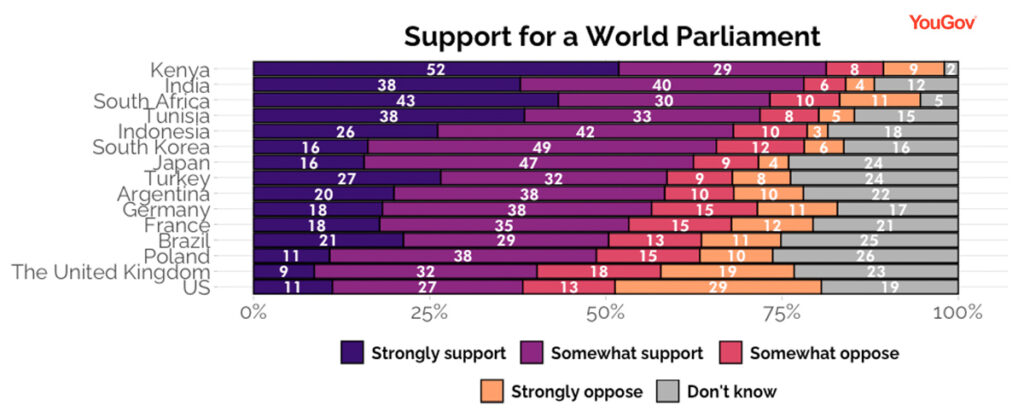Public Support for a World Parliament is Surprisingly Strong and Widespread
October 9, 2023

October 9, 2023

An international survey carried out by the market research firm YouGov on behalf of the German Friedrich Ebert Foundation found that public sentiment in 13 of 15 countries covered in the study—accounting for 38 percent of the world’s population—strongly approves of the creation of a world parliament. With the exception of two countries, respondents who “strongly” or “somewhat” approved of the notion significantly outweighed those who oppose it.
It is often claimed that nationalism is on the rise again. But many people, often clear majorities, would support institutional moves towards building a global society. This poll confirms that they would endorse a global democracy that is empowered to deal with global challenges. Governments should no longer ignore this desire and potential.
On average, 60% leaned towards supporting a world parliament and world law
On average, 60% of respondents leaned towards supporting “the creation of a new global parliament that represents every country in the world, where every country would be represented based on how many citizens it has, rather than its own national government representation to the UN”.
The survey question further elaborated that:
the Parliament would meet to handle global issues like global peace, climate change, and emergency situations like pandemics. The Parliament would be part of a global legislative system that under certain circumstances would pass legally binding laws to govern the world as a whole. Would you support or oppose the founding of a World Parliament?
Only 22% on average leaned towards disapproval. Top support was recorded in Kenya where an overwhelming majority of 81% leaned towards approving of a world parliament with 52% voicing strong and 29% somewhat support. Only 17% disapproved and 2% answered they do not know, the lowest figure in this category registered in the entire poll.

Support for a world parliament and binding world law found in the 15 countries covered in the 2023 FES Global Census poll. Image/data: YouGov/Friedrich Ebert Stiftung. Published here with kind permission.
Next on the list, in order of the percentage of those leaning towards support, are India (78% in favor and 10% opposed), South Africa (73% and 21%), Tunisia (71% and 13%), Indonesia (68% and 13%), South Korea (65% and 18%), Japan (63% and 13%), Turkey (59% and 17%), Argentina (58% and 20%), Germany (56% and 26%), France (53% and 27%), Brazil (50% and 24%) and Poland (49% and 25%). At the bottom of the 15-country-poll are the United Kingdom (41% and 37%) and the United States (38% and 42%) which were also the only cases where more respondents “strongly opposed” rather than “strongly supported” the notion.
An extensive study carried out earlier on sentiments toward global democracy found majority support in the UK and the United States as well for the idea of a democratically governed world. The new survey as well as earlier ones show consistently broad public support for binding global decision-making as opposed to voluntary international agreements only.
Survey confirms previous studies that found support as well
According to Democracy Without Borders which has been running a campaign for a UN Parliamentary Assembly for over 15 years, the actual proposal of a world parliament is that of a two-chamber system. One chamber would continue representing the governments of member states while the other would be composed of elected parliamentarians. The parliamentary body thus would not replace but complement national government representation.
RELATED
Andreas Bummel sits down with us to discuss the role that a World Parliamentary Assembly could play in revitalizing a process of long-needed reforms and more.
Previous survey experiments indicated that people prefer such a two chamber system over the status quo of exclusive government representation at the UN. The idea was recently endorsed in a report of an international study group convened by the Global Governance Forum that presented proposals and principles for a revision of the 1945 UN Charter with a view of the UN’s Summit of the Future scheduled for September 2024.
The public also endorses pragmatic first steps in the direction of a world parliament. A 12-country-poll released in June 2023 found that on average 62% supported the proposal of setting up a UN Parliamentary Network “to inform parliamentarians of the UN’s agenda and obtain their feedback on it”. At the time, the researchers concluded that the barrier to reforming global governance “is not popular opposition” but the reluctance of governments to challenge entrenched notions of national sovereignty which are increasingly at odds with the global nature of the problems we face, which require much stronger international cooperation.
Reluctance of governments is the barrier, not popular opposition
In an introduction to the new Global Solidarity Report that draws on international survey data, too, Barbados’ Prime Minister Mia Mottley wrote that “people worldwide share more solidarity than governments have hitherto harnessed”.
According to a UN General Assembly resolution adopted on 1 September 2023, the UN Summit of the Future is to approve of an “outcome document” which includes a chapter on “transforming global governance”.
Up to this point, however, the question of enhancing democratic representation and participation at the UN through a UN parliamentary body has been ignored in the official run-up to the summit despite strong popular support and thoroughly thought through proposals. In particular, the establishment of a UN Parliamentary Assembly, a proposal that lies between the low-threshold UN Parliamentary Network and the high-ambition world parliament idea, has attracted wide support in civil society, among experts, and from parliamentarians, including the European Union.
A statement released by the Climate Governance Commission last month notes, among other things, that diplomatic deliberation on “deeper reforms” of the international architecture “should commence immediately”, including on establishing “a parliamentary body or bodies at the United Nations and other international organizations to advise and better represent the world’s peoples”. The Commission will present a detailed report in November.
Governments of the countries covered in this recent poll could leverage relevant diplomatic moves on strong popular support. Kenyan President William Ruto in particular has been promoting ambitious global proposals such as a global financial transaction tax or a global carbon emission taxation regime, both of which made it into the Nairobi declaration of African heads of government last month. Following the logic of “no taxation without representation”, it would only be a small step to embracing the notion of a global parliament which would ensure representation of global citizens in matters related to global taxation.
The latest data on public support of a world parliament was part of the fourth annual FES Global Census which examines public opinion on key matters of multilateralism and international cooperation. (The data is published here with kind permission).
According to Michael Bröning, head of the New York office of Friedrich Ebert Foundation, this year “the results were particularly remarkable and also astonishing in many respects”. “It seems remarkable that especially in times of crisis, global cooperation is attributed a particularly high value”, he commented.
Written by Andreas Bummel
2020 Global Governance Forum Inc. All Rights Reserved